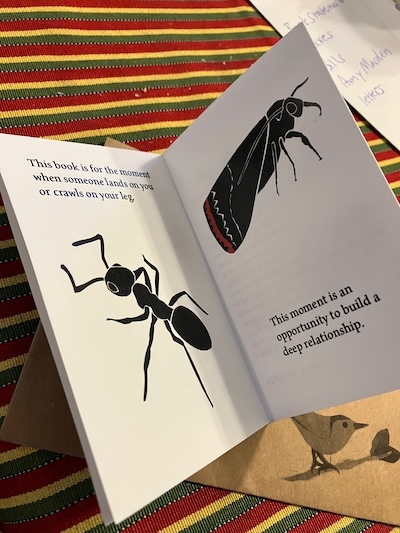It's a cold, surreal post-apocalyptic world, plagued by meteor showers, crumbling apartments patrolled by tigers, one where former tar-spreading technicians repurpose themselves as morning soup sellers. Bobby is wakened by a knocking at his door. He doesn't open it, but he's told, through the closed door, that Belle-Medusa, an immensely huge jellyfish, needs his help. Belle-Medusa has a library of scents in her memory, but they're mainly ocean scents. She wants Bobby to collect and convey land scents to her:
For this purpose, Belle-Medusa has already "plugged into" Bobby. There are various ways he can convey the scents to her, but the way he settles on is to plunge his face into water and speak them.
( Heh, this got long. Let's put in a cut. )
It's a strange and wonderful story, and I recommend it. I read it in an anthology called XO Orpheus: Fifty New Myths, edited by Kate Bernheimer and published in 2013. The anthology was lent to me by a friend who had picked out that story especially for me to read because (I'm flattered to say), they said it reminded me of the story of mine they'd read--and also, I suspect, because the story's important to them: it's entered their vocabulary. They talk about their scent library. The other stories in the collection look promising too; while I'm borrowing the book, I think I'll read some more.
It also exists as a 64-page standalone publication, but only in its original French, as Belle-Méduse. For the anthology, the translation was done by Sarah and Brian Evenson.
*Manuela Draeger is a fictitious author, a librarian whose stories are intended as distraction for children in containment camps. The author of her world is Antoine Volodine ... which is in turn a pen name of the writer Jean Desvignes.
In truth, she only had one passion anymore: she collected smells. Aromas, perfumes, whiffs, and scents of all types. She numbered them and she put them in tiny special cases in her memory, in a classification system that nobody, apart from herself, was able to understand.
For this purpose, Belle-Medusa has already "plugged into" Bobby. There are various ways he can convey the scents to her, but the way he settles on is to plunge his face into water and speak them.
I had my cheek pressed against the windowpane. Just under my nose, fed by the steam that escaped from my mouth, the frost drew branching ice wisps, which imprisoned the dust. If I had had to specify the smell that lingered on the surface of the glass, I would have spoken of a dusty ice floe, of frozen goose down, of dark sherbet. Wait, I thought, maybe I could send that to Belle-Medusa, in order to check that the communication between us is well established.
I left my observation post. I groped my way to the bathroom and I filled the sink with what flowed from the faucet, water that carried with it cubes and needles of ice. Before immersing my face, I had to stir it with my hand so as not to use the end of my nose to break the film threatening to form ... I sank my head into it to my ears.
"It's me, Belle-Medusa," I said.
( Heh, this got long. Let's put in a cut. )
It's a strange and wonderful story, and I recommend it. I read it in an anthology called XO Orpheus: Fifty New Myths, edited by Kate Bernheimer and published in 2013. The anthology was lent to me by a friend who had picked out that story especially for me to read because (I'm flattered to say), they said it reminded me of the story of mine they'd read--and also, I suspect, because the story's important to them: it's entered their vocabulary. They talk about their scent library. The other stories in the collection look promising too; while I'm borrowing the book, I think I'll read some more.
It also exists as a 64-page standalone publication, but only in its original French, as Belle-Méduse. For the anthology, the translation was done by Sarah and Brian Evenson.
*Manuela Draeger is a fictitious author, a librarian whose stories are intended as distraction for children in containment camps. The author of her world is Antoine Volodine ... which is in turn a pen name of the writer Jean Desvignes.



























